




Keeping your washing machine clean is essential for maintaining its performance and prolonging its lifespan. Over time, limescale and detergent residue can build up inside the machine, affecting its efficiency and leaving your clothes less clean. While there are various commercially available washing machine cleaners, you may be wondering if you can use kettle descaler in your washing machine.
The short answer is no, you should not use kettle descaler in your washing machine. Kettle descaler is specifically designed to remove limescale from the heating element and interior of a kettle, which is a different kind of buildup than what occurs in a washing machine. Using kettle descaler in your washing machine can potentially damage the machine and its components, as well as leave a residue on your clothes.
Instead, it is recommended to use a washing machine cleaner specifically designed for this purpose. These cleaners are formulated to remove limescale, dirt, and detergent buildup from your machine without causing any harm. They are easy to use and typically involve running an empty cycle with the cleaner to effectively clean the interior of your washing machine. Regular cleaning of your washing machine will help ensure optimal performance and keep your clothes fresh and clean.
In addition to using a washing machine cleaner, there are other tips and tricks you can follow to maintain a clean washing machine. Avoid overloading the machine, as this can lead to inadequate cleaning and cause buildup over time. Also, be mindful of the type and amount of detergent you use. Using too much detergent or the wrong type for your machine can contribute to buildup. Lastly, leave the washing machine door open between cycles to allow air to circulate and prevent the growth of mildew and odors.
Tip: If you notice any unusual smells or your clothes are not coming out as clean as they used to, it may be a sign that your washing machine needs a thorough cleaning. Don’t wait until it becomes a problem — regular maintenance and cleaning will help keep your machine in top shape.
Can you use kettle descaler in the washing machine?
Kettle descaler is specifically formulated to remove limescale build-up in kettles and is not designed for use in washing machines. While both appliances may be affected by limescale, they require different cleaning solutions due to their varying designs and functions.
Using kettle descaler in a washing machine can potentially damage the appliance and its components. The chemicals in the descaler may not be suitable for the materials used in the washing machine and could lead to corrosion or other issues.
It is recommended to follow the manufacturer’s instructions for cleaning and maintenance of your washing machine. Typically, washing machine manufacturers recommend using specific cleaning products or homemade solutions, such as vinegar or baking soda, to remove limescale and maintain the machine’s performance.
If your washing machine has limescale build-up, it is advisable to consult the manufacturer’s manual or contact their customer support for guidance on the appropriate cleaning method. They may recommend a specific descaling product that is safe for your machine.
In conclusion, it is not recommended to use kettle descaler in a washing machine. Stick to the manufacturer’s instructions and use appropriate cleaning products to keep your washing machine in optimal condition.
Understanding the differences and similarities between kettle descaler and washing machine cleaner
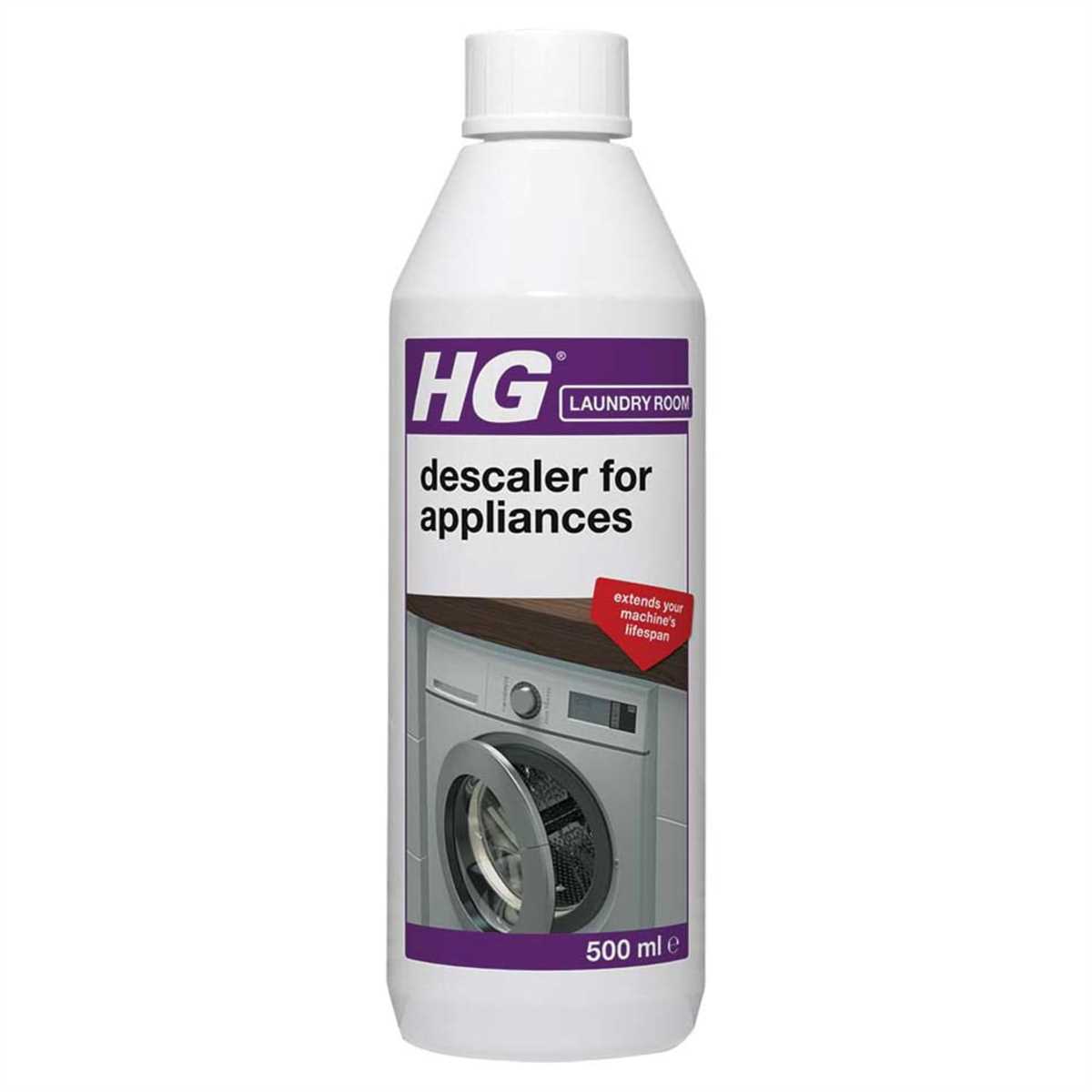
When it comes to cleaning appliances, it’s important to use the right products for the job. Two common cleaning products that are often used in households are kettle descaler and washing machine cleaner. While both products serve the purpose of removing limescale and residue buildup, there are some key differences and similarities between them.
Similarities
- Objective: Both kettle descaler and washing machine cleaner aim to clean appliances and remove limescale and residue buildup.
- Chemical composition: Both products usually contain acidic compounds that break down limescale and other deposits.
- Effectiveness: Both kettle descaler and washing machine cleaner can effectively remove limescale and residue, restoring the efficiency and performance of the appliances.
Differences
| Kettle Descaler | Washing Machine Cleaner |
|---|---|
|
|
It’s important to note that kettle descaler should never be used in a washing machine, as it may damage the appliance and fabrics. Similarly, using washing machine cleaner in a kettle would not be effective in removing limescale and could contaminate the water.
Ultimately, understanding the differences and similarities between kettle descaler and washing machine cleaner can help ensure you are using the right product for the specific cleaning needs of your appliances.
Tips and tricks for cleaning your washing machine
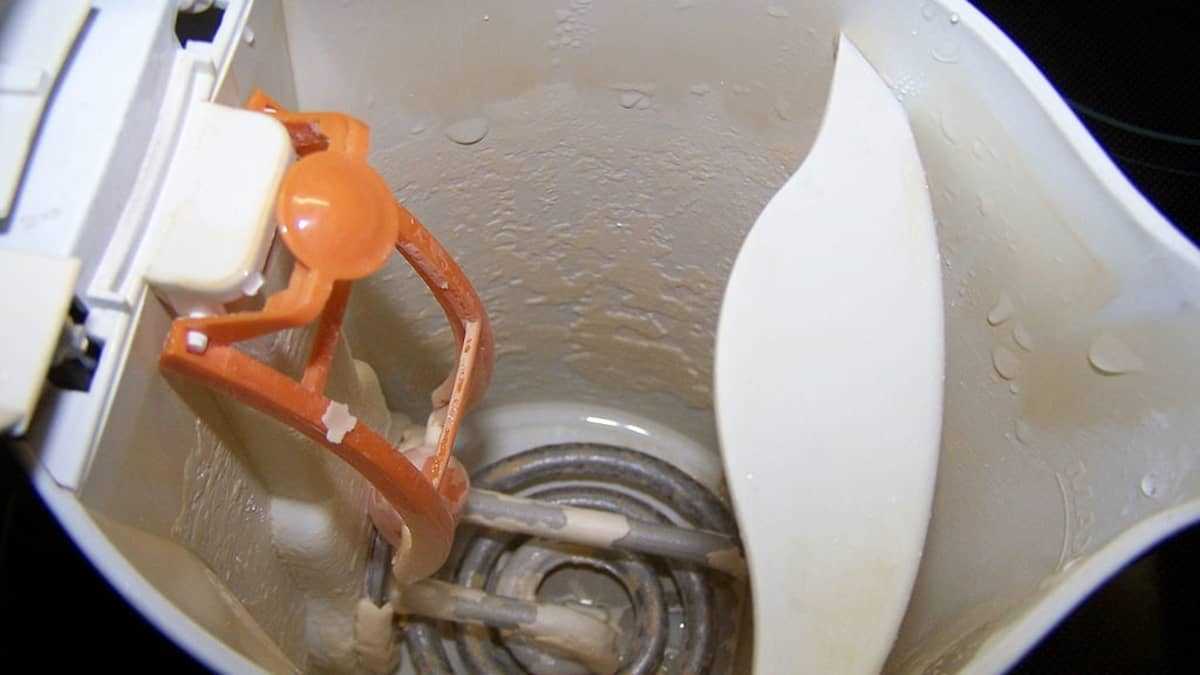
1. Regular cleaning
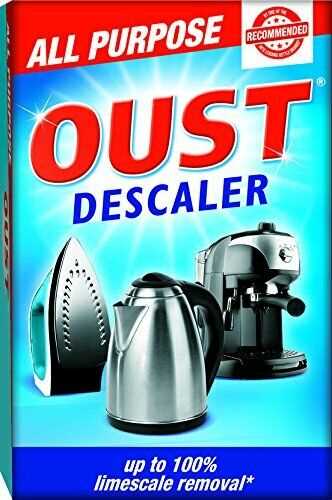
Regularly cleaning your washing machine is essential to keep it running efficiently and to prevent any buildup of dirt, grime, or mold. To clean your washing machine, follow these steps:
- Empty the washing machine and remove any laundry or items from inside.
- Mix equal parts of white vinegar and water in a spray bottle.
- Spray the inside of the machine, including the drum, door seal, and detergent dispenser, with the vinegar and water mixture.
- Use a clean cloth or sponge to wipe away any dirt or residue.
- Run a hot water cycle without any laundry, adding two cups of vinegar to the detergent dispenser.
- After the cycle is complete, wipe the inside of the machine again with a clean cloth or sponge.
- Leave the door open for some time to allow the machine to air dry.
2. Removing bad odors
If your washing machine has a persistent bad odor, there are a few tricks you can try:
- Run a hot water cycle with a cup of baking soda added to the detergent dispenser.
- If the odor persists, mix equal parts of water and bleach in a spray bottle and spray the inside of the machine. Let it sit for a few minutes, then wipe it clean.
- Leave the door open after each use to allow air circulation and prevent mold or mildew growth.
3. Cleaning the detergent dispenser
The detergent dispenser can become clogged with detergent residue or fabric softener. To clean it:
- Remove the detergent dispenser from the machine.
- Soak it in warm soapy water for a few minutes.
- Scrub the dispenser with a brush to remove any residue.
- Rinse it thoroughly and let it dry before putting it back into the washing machine.
4. Maintaining the drum
To keep the drum of your washing machine in good condition:
- After each use, wipe the drum with a clean cloth to remove any residue.
- Check the drum for any foreign objects, such as coins or hairpins, before starting a wash cycle.
- Remove any lint or debris from the drum and filter regularly to prevent clogging and improve machine performance.
5. Keep the washing machine dry
Excess moisture can lead to mold or mildew growth. To keep your washing machine dry:
- Make sure to leave the door open after each use to allow air circulation.
- Wipe down the door seal regularly to remove any moisture or residue.
- If possible, move the machine to a well-ventilated area.
6. Using descaler
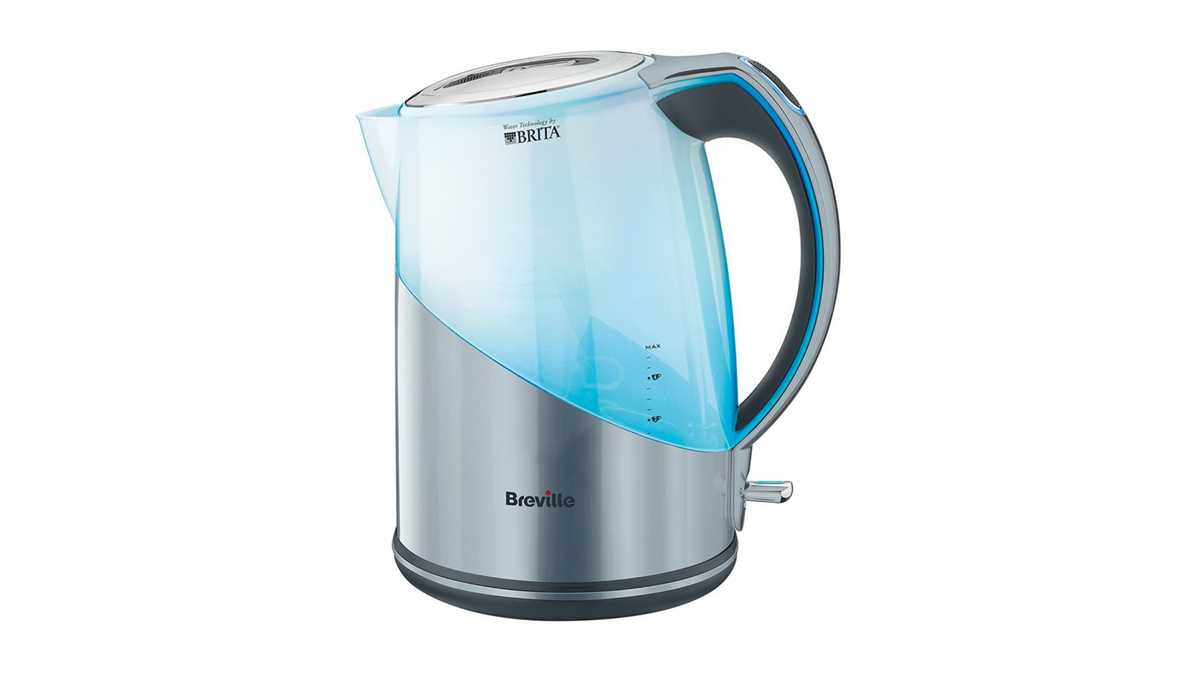
If your washing machine has a buildup of limescale, you can use a descaler specifically designed for washing machines. Follow the instructions on the descaler packaging for the best results.
Conclusion
Regular cleaning and maintenance of your washing machine will not only keep it running efficiently but also prolong its lifespan. By following these tips and tricks, you can ensure that your washing machine stays clean and odor-free for years to come.
The potential risks of using kettle descaler in your washing machine
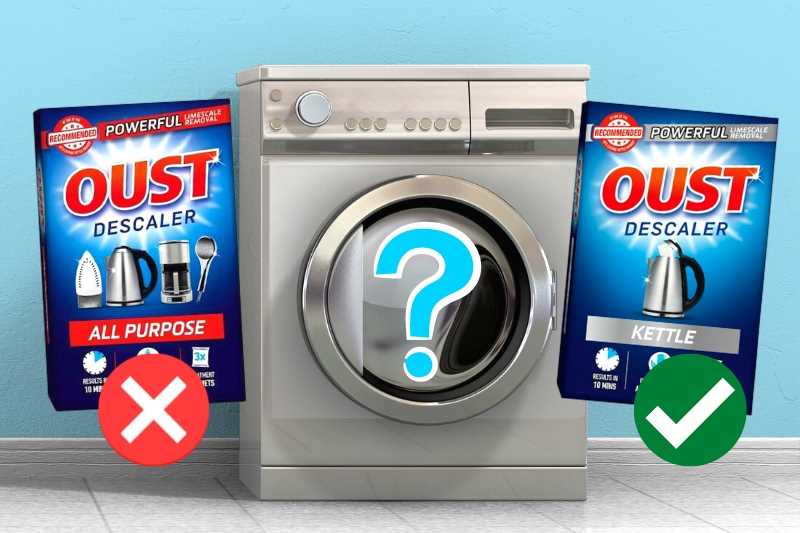
While kettle descalers are designed to remove limescale and mineral deposits from the interior of your kettle, using them in your washing machine can pose several risks. Here are a few potential dangers associated with using kettle descaler in your washing machine:
- Damage to the washing machine: Kettle descalers are often formulated with chemicals and acids that are specifically designed for the materials used in kettles. These chemicals may not be suitable for the materials commonly found in washing machines. Using kettle descaler in your washing machine may lead to corrosion or damage to the delicate components of the machine, such as rubber seals, plastic parts, or the drum itself.
- Residue and staining: Kettle descalers can leave behind residue or stains on the interior of your washing machine. This residue may be difficult to remove and can potentially affect the performance of your machine. Additionally, the residue may transfer onto your clothes during the wash cycle, leaving undesirable marks or stains.
- Health hazards: The chemicals present in kettle descaler products may be harmful if they come into contact with your skin or if they are inhaled. Washing machines typically have a larger interior volume compared to kettles, meaning that a larger amount of descaler product may be required. This increases the likelihood of potential exposure to these harmful chemicals.
- Voiding warranty: Using kettle descaler in your washing machine could potentially void the warranty provided by the manufacturer. Most manufacturers specify the types of cleaning products that are safe to use in their machines. If you use a product that is not recommended or approved by the manufacturer, any damage caused may not be covered under warranty.
It is essential to follow the manufacturer’s instructions and use only approved cleaning products specifically designed for washing machines. These products are often formulated to be safe for use on the materials and components found in washing machines, minimizing the risk of damage or other issues.
If you are experiencing limescale or mineral build-up in your washing machine, it is recommended to consult the manufacturer’s guidelines or contact a professional for advice on how to safely clean and maintain your machine.
Alternative solutions for descaling your washing machine
Descaling your washing machine is an important task that helps maintain its efficiency and prolong its lifespan. While commercial descaling products are commonly used, there are alternative solutions that can be just as effective and more environmentally friendly.
Vinegar
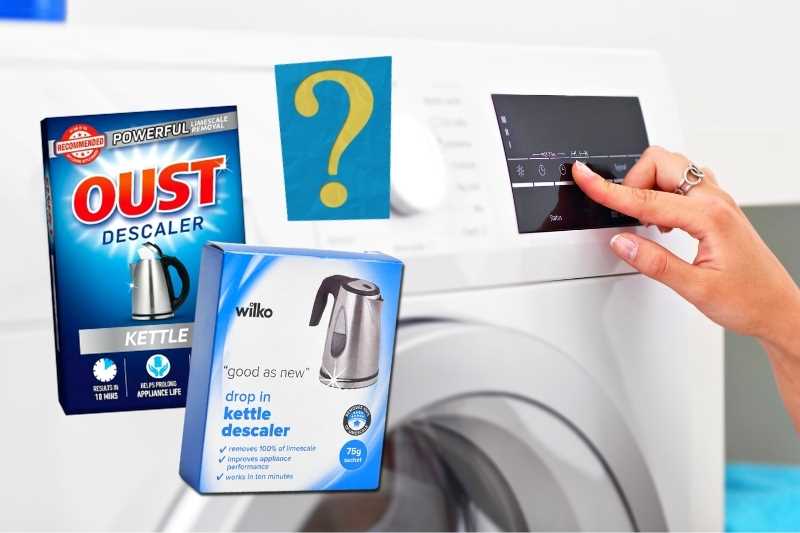
One popular alternative for descaling your washing machine is vinegar. White vinegar, known for its acid content, can help break down mineral deposits and remove residue. To use vinegar as a descaling solution, follow these steps:
- Empty your washing machine and remove any clothes.
- Fill your washing machine with hot water.
- Add 2 cups of white vinegar to the water.
- Run a regular cycle.
- Once the cycle is complete, wipe down the inside of the washing machine and rinse it thoroughly.
Vinegar not only descales your washing machine but also helps eliminate odours and disinfects it.
Baking Soda and Citric Acid
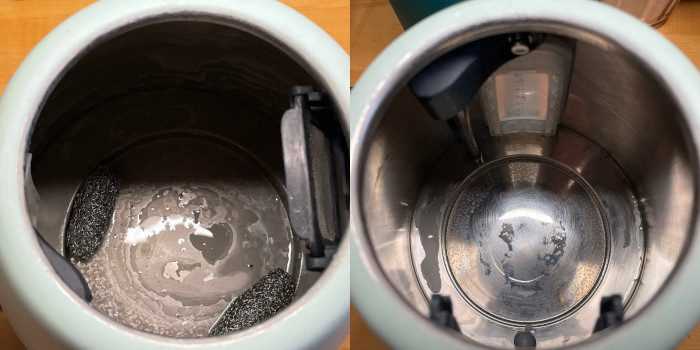
Another alternative solution for descaling your washing machine is a combination of baking soda and citric acid. These natural ingredients can effectively remove mineral deposits and grime. Here is how you can use baking soda and citric acid:
- Empty your washing machine and remove any clothes.
- Mix equal parts of baking soda and citric acid (about 1/4 cup each) and add it to the detergent drawer.
- Run a regular cycle using hot water.
- Once the cycle is complete, wipe down the inside of the washing machine and rinse it thoroughly.
Baking soda and citric acid can also help eliminate odours and freshen up your washing machine.
Lemon Juice
Another natural alternative for descaling your washing machine is lemon juice. The citric acid present in lemon juice can effectively dissolve mineral deposits and remove residue. Here is how you can use lemon juice:
- Empty your washing machine and remove any clothes.
- Fill your washing machine with hot water.
- Add the juice of 3-4 lemons to the water.
- Run a regular cycle.
- Once the cycle is complete, wipe down the inside of the washing machine and rinse it thoroughly.
Lemon juice not only descales your washing machine but also leaves a fresh citrus scent.
| Descaling Solution | Pros | Cons |
|---|---|---|
| Vinegar | Effective, affordable, readily available | Strong smell |
| Baking Soda and Citric Acid | Natural, effective, freshens up the washing machine | Requires mixing ingredients |
| Lemon Juice | Natural, effective, leaves a fresh scent | May require more lemons for larger machines |
These alternative solutions provide effective descaling options for your washing machine, ensuring its optimal performance and cleanliness.
FAQ
Can I use kettle descaler to clean my washing machine?
Yes, you can use kettle descaler to clean your washing machine. Kettle descaler is designed to remove limescale buildup, which can also occur in washing machines. However, it is important to read the instructions on the descaler carefully and follow them to ensure safe and effective use.
Is it safe to use kettle descaler in a washing machine?
Yes, it is generally safe to use kettle descaler in a washing machine. However, it is important to make sure that the descaler is suitable for use in washing machines and to follow the instructions on the product packaging. This will ensure that you use the correct amount of descaler and that it is safe for your specific washing machine model.
What are the benefits of using kettle descaler in a washing machine?
Using kettle descaler in a washing machine can help remove limescale buildup, which can affect the performance and efficiency of the machine. By removing limescale, you can improve the washing machine’s ability to clean clothes effectively and prevent any unpleasant odours that may arise from limescale buildup. Additionally, regular descaling can prolong the lifespan of your washing machine.
Can I use any descaler in my washing machine?
No, you cannot use any descaler in your washing machine. It is important to use a descaler specifically designed for washing machines. Using the wrong type of descaler may not effectively remove limescale and could potentially damage the machine. Always read the instructions on the descaler packaging and make sure it is suitable for use in washing machines.
How often should I use kettle descaler in my washing machine?
The frequency of descaling your washing machine depends on factors such as the hardness of your water and the amount of limescale buildup. Generally, it is recommended to descale your washing machine every few months or as needed. However, if you notice any signs of limescale buildup, such as decreased performance or unpleasant odours, it may be necessary to descale more frequently.












